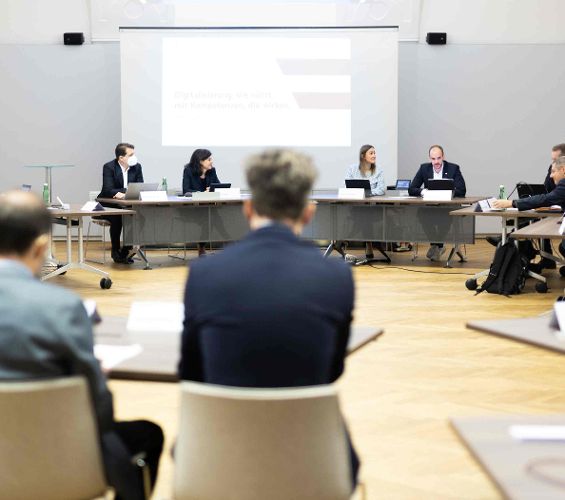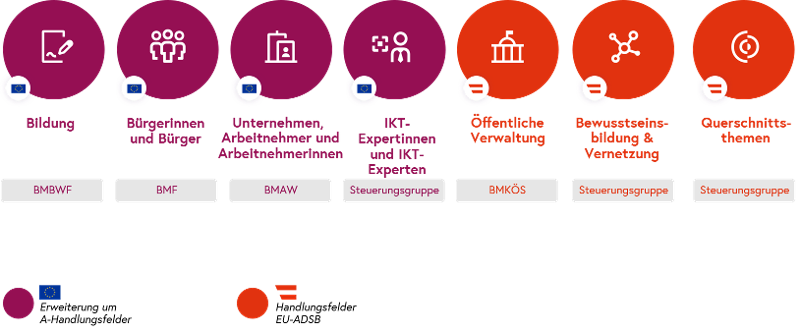
SEIZING THE OPPORTUNITIES OF DIGITALISATION TOGETHER
DIGITAL SKILLS INITIATIVE
FOR AUSTRIA
Office for Digital Skills
The Digital Skills Office was established on October 12, 2023. It is located in the OeAd, Austria's Agency for Education and Internationalization.
In Austria, approximately 63% of people aged 16 to 74 possess basic digital skills, placing us nine percentage points above the EU-27 average. The European Commission's goal is that at least 80% of the 16- to 74-year-old population of the EU member states should have at least basic digital skills by 2030.
4,500 Workshops Throughout Austria
In Austria, 4,500 “Digital Überall” (“Digital Everywhere”) workshops are being held to teach basic digital skills. You can find more information on this under “Digital skills - make the internet your friend”.
The “Digital Skills” office is also involved in implementing the work program of the Digital Skills Strategy. The development and implementation of a uniform digital skills model is also on the agenda.
The work programme of the "Digital Skills Initiative for Austria" is continuously developed together with all stakeholders.
It is implemented by an office for digital skills, which has been set up in Austria's Agency for Education and Internationalisation (OeAD).
At the "Digital Skills Summit", the effect of measures taken are evaluated and approaches are further developed.
Cooperation Partner for Course Providers
In addition to contributing to the implementation of the Digital Skills Strategy and the Digital Skills Model, the office's work program until 2026 also includes a concept for quality assurance and certification of digital skills, the establishment of a Digital Skills Network involving stakeholders and initiatives, and active positioning in the European Commission's Digital Skills and Jobs Coalition.
The Digital Decade
Shaping Europe's digital future together


The four goals of the digital compass:
1. Skills: building a digitally skilled population and highly qualified digital professionals
2. Infrastructures: Building a secure and sustainable digital infrastructure
3. Business: Digitalisation of companies
4. Public services: Digitalisation of public services
The Commission will implement the EU's digital ambitions for 2030 in concrete terms:
- Targets at EU level and trajectories at EU and national level
- A common governance framework to monitor progress and address weaknesses
- multi-country projects with combined investment from the EU, Member States and the private sector
The Digital Skills Indicator (DSI) forms the basis on which the strategic priorities for the promotion of digital skills in society, business and education are built.
As part of the Digital Skills Initiative, Statistics Austria has drawn up an initial assessment in the form of an analysis report. Based on the results, the first measures of the Digital Skills Initiative were designed.
Digital Skills Initiative
23.2.2023: Start of the implementation of the "Digital Skills Initiative for Austria"
A joint press conference was held by the participating ministries to kick off the implementation of the Digital Skills Initiative for Austria (DKO). The digital skills model makes digital expertise transparent for employers, employees and providers and promotes digital development.
The initiative, which is supported by the BKA (previously by the BMF), BMKOES, BMAW and BMBWF, aims to improve basic digital skills in the population and IT skills for the economy in a targeted manner. Surveys such as the European DESI Index show the need for action in Austria. The DKO brings together all stakeholders and initiatives in Austria to improve digital skills.

Common “currency” for digital skills
Ministries, federal states, social partners, cities and municipalities, companies and education providers are working together in a strategically coordinated manner on the topic of digital skills with scientific support.
The kick-off meeting took place following the launch. A key project of the digital skills initiative is the Austrian skills model for digital skills “DigComp 2.3 AT”.
According to the DESI Index, around 30-40% of the population between the ages of 16 and 74 lack basic digital skills. Large gaps in knowledge, especially in general basics and IT security. At the same time, the need for digital qualifications in business and the world of work is increasing. As a result, SMEs are often unable to make sufficient use of digital technologies. Further challenges for digital fitness are generational, gender and urban-rural gaps.

Making Austria a pioneer in digital skills
Joint initiative of the BKA (initiated by the BMF), BMKOES, BMAW and BMBWF: By 2030, as many people as possible in Austria should have basic digital skills - existing initiatives of all ministries should be strengthened in a targeted manner.
In order for Austria to benefit from the economic and ecological advantages of digitisation, the breadth and depth of digital skills in society, business and administration are essential.
The “Digital Skills Initiative for Austria” was presented on December 7, 2022 by Vice Chancellor Werner Kogler (BMKOES) and the Federal Ministers Magnus Brunner (BMF), Martin Kocher (BMAW) and Martin Polaschek (BMBWF).
With this initiative under the European umbrella of the “Digital Skills and Jobs Coalition” (DSJC), we want to make Austria a European pioneer in the field of digital skills and establish a strong European axis.
Fields of action
The "Digital Skills Initiative" bundles the quality-assured teaching of basic digital skills among the population and in various fields of activity such as ICT experts, education, citizens, the world of work and business and public administration.
The fields of action include the following areas:


Citizens: Under the responsibility of the Federal Chancellery
Companies, employees and workers: Under the responsibility of the Federal Minister of Labour and Economy
ICT experts: Under the responsibility of the steering group/Federal Chancellery and Federal Ministry of Finance
Public administration: Under the responsibility of the Federal Ministry for Arts, Culture, the Civil Service and Sport
Awareness-raising and networking: Under the responsibility of the steering group
Cross-cutting issues (e.g. kindergarten): Under the responsibility of the steering group

Goals and measures
Teaching digital skills


The goal is to make Austrians digitally fit by 2030. The measures range from financing future training and further education for all interested parties to a uniform competence level and certification system.
Strengthen basic digital skills


Increase proportion of IT specialists


Talent development


National reference framework for digital skills


Role model for the public sector


"Digital Skills for All" initiative November and December 2023


Over 8,500 interested people took part in the free workshop offer.
A total of 36 education providers carried out the workshops on the main topics of digital senior education, E-government and (safe) use of digital media for parents and young people.
Digital Skills Dialogues
.jpg) Quelle: vorarlberg.at/presse, A. Serra
Quelle: vorarlberg.at/presse, A. Serra
The "Digital Skills Dialogues" initiated by the Digital Skills Initiative took place in the federal states in spring 2023. The aim of the dialogues was to strengthen joint cooperation between the federal and state governments in the area of digital skills. The Digital Austria Pact was concluded as the basis for the cooperation. The dialogues started on 3 March in Dornbirn, the last event took place in Klagenfurt on 26 May.
A total of 145 measures from the federal states were collected at the Digital Skills Dialogues and many good practices were presented as a learning field for the federal governments and other federal states.
In addition to the topics of cross-sectional measures (overarching strategy development, database, digital skills network, awareness-raising, certification), funding and IT specialists, the focus of the workshops was on low-threshold, target group-orientated measures to promote digital skills:
- broad basic qualification,
- "Train the Trainer" programmes and the
- Further training/professional qualification.
Dates of the Digital Skills Dialogues


Digital Austria Pact of the Digital Skills Initiative


With this in mind, the federal government's Digital Competence Initiative Austria (DKO) aims to
- by 2030, as many people in Austria as possible will have basic digital skills ,
- the proportion of IT specialists and especially female IT specialists will be increased and digital talent will be promoted in order to meet the economy's need for skilled workers and to make the best possible use of the growth potential of digitalisation,
- digital skills will be made measurable and comparable with the introduction of a national reference framework.
Securing digital skills together


→ raise awareness of the crucial importance of digital skills for the future in all areas of life and business
→ contribute to closing the existing “digital gap” and support digital accessibility for the secure participation of all people, regardless of age, income or disability
→ improve the basic digital skills of all citizens so that they can benefit as much as possible from the many opportunities offered by Digitalisation - including in the area of administration,
→ to inspire as many people as possible - especially girls and women - interested in digital training and professions and to support their ongoing training in the sense of lifelong learning,
→ to support existing employees from all industries and sectors as well as job seekers in securing or expanding their professional skills through digital competencies
→ actively promote qualification in companies, intensify cooperation and networking between state and non-state actors to promote digital skills,
→ ensure a transparent and reliable standard for digital skills at the various competence levels by using and disseminating the Digital Competence Model for Austria - DigComp AT, and
→ to support the Digital Skills Initiative for Austria as a platform for the strategically sound further development of digital skills in Austria
Digital Skills Summit


The "Digital Skills Summit" marked the conclusion of the federal/state strategy development process.
The jointly developed "Digital Skills Strategy" with the most important key points and measures was presented in advance at the press conference by Finance Minister Magnus Brunner and then State Secretary Florian Tursky and presented at the summit.
Strategy Digital Skills in Austria
Shaping the future together!
The acquisition and further development of citizens' personal digital skills is an essential prerequisite for successful digitisation. The joint strategy sets targeted priorities and measures for society, business and administration.
You can also find the entire strategy paper in the download area.
The skills package for Austria
Joining forces to promote digital skills
With the Digital Skills Initiative, Austria is pooling all its strengths for more digital skills and has established a holistic stakeholder initiative supported by four ministries (BMF, BMKOES, BMAW, BMBWF) for the first time.
The "Strategy Digital Skills for Austria" of the Digital Skills Initiative was developed in a nationwide dialogue process with more than 500 experts and stakeholders from 80 institutions. Around 350 measures and initiatives were identified, clustered and bundled.
On this basis, the "Strategy Digital Skills for Austria" sets eight strategic priorities in a skills package with specific measures for the further development of digital skills.
The competence package comprises the following eight strategic priorities:
1. Introducing a frame of reference


2. Low-threshold education


3. Train the trainers


4. Utilising best practices


5. Public sector as a role model


6. train IT specialists


7. accompany AI in the world of work


8. Being an international pioneer


“With the competence package for digital skills, we are providing strong impetus and concrete incentives for the federal states, educational institutions, business and society to further develop the digital skills that are important for successful Digitalisation on the basis of a uniform competence model. The whole of Austria will benefit from this - it will sustainably advance the location and its competitiveness.”
Digital Innovation School for Top IT-Talents
As part of the Digital Skills Initiative (DKO) for Austria, the federal government is implementing a joint initiative to develop and secure top IT-talents for Austria.
With the Digital Innovation School, a globally unique interdisciplinary training opportunity is being created at the Complexity Science Hub (CSH). The doctoral program will start in autumn with the first students.
This will support the DKO's strategic goal of increasing the number of IT experts.
The doctoral program will accept at least five outstanding students each year.
These students do not have to commit themselves to a scientific niche. The program integrates a range of topics and disciplines such as Data, Network & Complexity Science.
In addition, students will be able to gain important experience in the implementation of research results in policy and practice - through collaborations and internships in public administration and companies.
The doctoral program meets the growing demand for specialists who are able to find solutions to current and future challenges facing society and the planet.
The CSH Digital Innovation School is run in cooperation with the partner universities of the Complexity Science Hub.
In addition, students of the Digital Innovation School will benefit from the CSH's close relationships with numerous other institutions in Austria and worldwide.

- An Initiative of the Digital Innovation School


